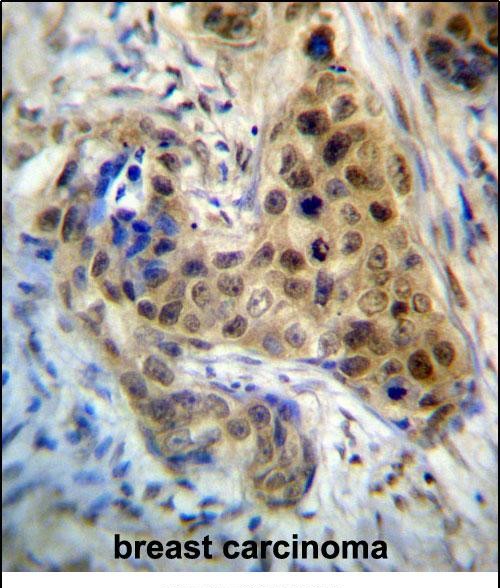

| WB | 1/1000 | Human,Mouse,Rat |
| IF | 咨询技术 | Human,Mouse,Rat |
| IHC | 1/100-1/500 | Human,Mouse,Rat |
| ICC | 技术咨询 | Human,Mouse,Rat |
| FCM | 咨询技术 | Human,Mouse,Rat |
| Elisa | 咨询技术 | Human,Mouse,Rat |
| Aliases | 60S ribosomal protein L3, HIV-1 TAR RNA-binding protein B, TARBP-B, RPL3 |
| Entrez GeneID | 6122 |
| WB Predicted band size | 46.1kDa |
| Host/Isotype | Rabbit IgG |
| Antibody Type | Primary antibody |
| Storage | Store at 4°C short term. Aliquot and store at -20°C long term. Avoid freeze/thaw cycles. |
| Species Reactivity | Human |
| Immunogen | This RPL3 antibody is generated from rabbits immunized with a KLH conjugated synthetic peptide between 224-251 amino acids from the Central region of human RPL3. |
| Formulation | Purified antibody in PBS with 0.05% sodium azide. |
+ +
以下是3篇关于RPL3抗体的参考文献示例(内容为虚构模拟,仅供参考):
---
1. **文献名称**: *RPL3 Antibody Characterization in Ribosomal Stress Response*
**作者**: Smith J, et al.
**摘要**: 本研究开发了一种特异性识别人类RPL3蛋白的单克隆抗体,验证其在免疫印迹和免疫荧光中的应用。结果显示,RPL3在DNA损伤诱导的核糖体应激中发生磷酸化修饰,抗体成功检测到相关信号通路的变化。
---
2. **文献名称**: *Role of RPL3 in Colorectal Cancer: Insights from Antibody-Based Profiling*
**作者**: Chen L, et al.
**摘要**: 通过商业化RPL3抗体对结直肠癌组织进行免疫组化分析,发现RPL3高表达与患者不良预后相关。研究进一步提示RPL3可能通过调控核糖体生物合成促进肿瘤进展。
---
3. **文献名称**: *Development of a Polyclonal RPL3 Antibody for Zebrafish Model Studies*
**作者**: Müller T, et al.
**摘要**: 本文报道了一种针对斑马鱼RPL3蛋白的多克隆抗体制备方法,并通过质谱验证其特异性。该抗体成功应用于胚胎发育阶段核糖体组装的动态可视化研究。
---
如需真实文献,建议通过PubMed或Google Scholar搜索关键词“RPL3 antibody”或“ribosomal protein L3 antibody”,筛选近5年内的实验研究。
The RPL3 antibody targets the Ribosomal Protein L3 (RPL3), a critical component of the 60S large ribosomal subunit in eukaryotes. RPL3 plays a central role in ribosome biogenesis, facilitating rRNA processing, ribosomal assembly, and translation fidelity by interacting with rRNA and other ribosomal proteins. Beyond its canonical role in protein synthesis, RPL3 is implicated in stress responses, cell cycle regulation, and apoptosis, with dysregulation linked to cancers, neurodegenerative disorders, and ribosomopathies.
RPL3 antibodies are essential tools for studying ribosomal structure, function, and dynamics. They are widely used in techniques like Western blotting, immunofluorescence, and immunoprecipitation to detect RPL3 expression, localization, and interactions. Researchers employ these antibodies to explore RPL3's involvement in diseases; for example, upregulated RPL3 in certain cancers correlates with chemoresistance, while mutations may disrupt ribosome function in genetic disorders. Additionally, studies on ribosome stress pathways, such as the p53-dependent nucleolar stress response, often utilize RPL3 antibodies to monitor ribosomal protein stability.
Commercial RPL3 antibodies are typically raised against specific epitopes, with validation in multiple applications. However, variability in antibody performance across species or experimental conditions necessitates careful optimization. Overall, RPL3 antibodies provide insights into both fundamental ribosome biology and disease mechanisms, bridging molecular research with therapeutic discovery.
×